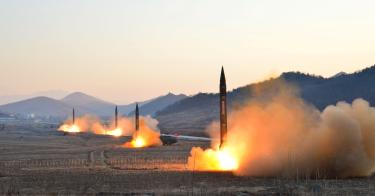Pyongyang has been popping off again with its most recent round of missile mania. No one is happy about it, especially potential North Korean “targets” including the United States, Japan and South Korea.
Another country equally displeased by the saber rattling? China.
North Korea’s launch this week of four (likely) SCUD ballistic missiles some 600 miles into the Sea of Japan — in the direction of Japan — is just the latest act in Pyongyang’s parade of provocations.
Last month North Korean leader Kim Jong Un not only tested a medium-range missile, he likely ordered the offing of his half-brother in Malaysia, using VX nerve agent.
You can completely understand how North Korea’s recent deadly demeanor — matched with the anticipation of a sixth nuclear test sometime soon — is causing concern for a bunch of countries.
North Korea is clearly committed to becoming a top-notch nuclear power that will bring it adulation at home and clout abroad. Other countries will then have to show North Korea the respect that the Korean Workers’ Party feels it deserves.
That includes China.
Beijing and Pyongyang are ostensible allies, going back to their founding after World War II. Indeed, Chairman Mao reportedly once said that North Korea and China were as “tight as lips and teeth.”
Mao may be long gone, but a special reverence for him is coming back into vogue in China.
Today, however, the bilateral relationship is tense; Pyongyang unsettles Beijing. There is concern among China’s communist cadre about the potential “fallout” from North Korea’s embrace of nuclear missile “diplomacy.”
China is in a tough spot — not that it deserves sympathy.
While unhappy with Pyongyang, Beijing doesn’t want to see the regime collapse, which would result in any number of nightmarish scenarios — civil war, “loose nukes” and a possible flow of North Korean refugees over the border into China.
Probably more important, Beijing doesn’t want to see U.S. troops above the 38th parallel, which divides North and South Korea. China likes the security of the buffer state that North Korea has provided since the (artificial) end of the Korean War.
These reasons are, of course, why China serves as North Korea’s biggest aid donor ( supplying both food and energy). It also gives Beijing influence in Pyongyang.
But besides regularly rescuing the regime, China worries about how others react to Pyongyang’s poking and prodding, which hasn’t been favorable to China’s perceived national interests in security and stability.
For instance, the Trump Team is reportedly involved in a North Korea policy review, which may deviate significantly from Team Obama’s policy of “strategic patience”—whatever that phrase means.
The United States is also beefing up its Asia defenses with the deployment of the Terminal High Altitude Area Defense, or THAAD, system to South Korea to blunt the North’s missile threat. Japan could also get THAAD.
China hates this because they believe missile defense undermines China’s own missile offense (which, oh, by the way, is Asia’s largest missile arsenal), especially against historical rival Japan and current competitor America.
The choice, of course, is China’s.
This piece originally appeared in the Boston Herald



